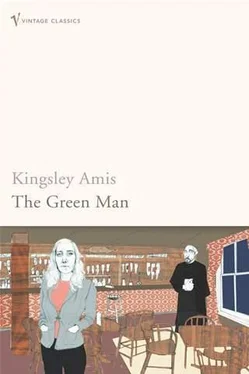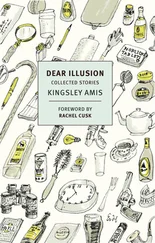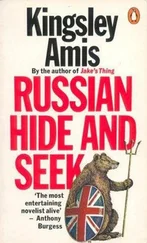Kingsley Amis - The Green Man
Здесь есть возможность читать онлайн «Kingsley Amis - The Green Man» весь текст электронной книги совершенно бесплатно (целиком полную версию без сокращений). В некоторых случаях можно слушать аудио, скачать через торрент в формате fb2 и присутствует краткое содержание. Жанр: Старинная литература, на английском языке. Описание произведения, (предисловие) а так же отзывы посетителей доступны на портале библиотеки ЛибКат.
- Название:The Green Man
- Автор:
- Жанр:
- Год:неизвестен
- ISBN:нет данных
- Рейтинг книги:5 / 5. Голосов: 1
-
Избранное:Добавить в избранное
- Отзывы:
-
Ваша оценка:
- 100
- 1
- 2
- 3
- 4
- 5
The Green Man: краткое содержание, описание и аннотация
Предлагаем к чтению аннотацию, описание, краткое содержание или предисловие (зависит от того, что написал сам автор книги «The Green Man»). Если вы не нашли необходимую информацию о книге — напишите в комментариях, мы постараемся отыскать её.
The Green Man — читать онлайн бесплатно полную книгу (весь текст) целиком
Ниже представлен текст книги, разбитый по страницам. Система сохранения места последней прочитанной страницы, позволяет с удобством читать онлайн бесплатно книгу «The Green Man», без необходимости каждый раз заново искать на чём Вы остановились. Поставьте закладку, и сможете в любой момент перейти на страницу, на которой закончили чтение.
Интервал:
Закладка:
‘Oh, Christ. With Amy holding her hand? She’d never have risked anything happening to Amy. And why should she? Knock herself off, I mean.’
‘That bit’s obvious. Thompson letting her down.’ Thompson was the man for whose sake Margaret had left me, and who had told her, four months before her death, that he was not after all going to leave his wife and children and set up a home with her.
‘That’s Thompson’s headache, if it’s anybody’s, which I don’t believe.’
‘I ought to have tried to stop her going.’
‘Oh, balls. How? She was a free agent.’
‘I ought to have treated her better.’
‘You treated her well enough for her to stay with you for twenty-two years. This is a load of crap, Dad. What’s bothering you isn’t that you were in any way responsible for her death, but that she died. Same with Gramps. Both those things remind you that you’ll be going the same way yourself one of these days. I know you’ll hate me taking a leaf out of Lucy’s book, but that is egotistical. Sorry, Dad.’
‘Okay. You may be right.’ He was certainly right about the first part of it—the small but permanent despair, and the illogical feeling of dread, that come from having spent so many years with a dead woman, talked, met people, gone to places, eaten, drunk with her, most of all (of course) made love to her, and had children by her. Even now I woke up three or four mornings a week assuming that Margaret was still alive.
‘How’s Amy?’ asked Nick. ‘From the look of her…’
I stopped listening as I heard, or thought I heard, a rustling noise at ground level outside the house, near the front door. I jumped up, ran to the window and looked out. The overhead lights were still on, showing walls, flowerbeds, road and verges as colourlessly empty as if nobody had ever been near them. The noise had stopped.
‘What’s up, Dad?’
‘Nothing. I thought I heard someone at the front door. Did you hear it?’
‘No. Are you all right?’ Nick looked warily at me.
‘Of course.’ It disturbed me that what I might or might not have heard, and identified, had happened immediately at the mention of Amy. I had no idea why I made this connection. I tried to think. There’s … been some talk of a burglar in the district. You were saying.’
‘Did you see anything?’
‘No. Go on.’
‘All right. I was just wondering how Amy feels about Mum’s death these days.’
‘I suppose at that age you forget a lot quite quickly. You put things behind you.’
‘But has she? What does she say about it?’
‘We haven’t gone into any of that.’
‘You mean you haven’t discussed it with her at all? But surely—’
‘You try asking a kid of thirteen how she feels about having her mother knocked down and killed in front of her eyes.’
‘No, you try.’ Nick stared at me. ‘Look, Dad, for some reason you’ve got death on the winkle. That’s all right with me, as long as you keep it as a sort of hobby. But one can’t afford to let a hobby get out of hand, so that it stops you paying attention to what’s really important. You must talk to Amy about this business. I’ll set it up for you if you like. We could all—’
‘No, Nick. Not yet. I mean give me a chance to think about it first.’
‘Sure. But I’m going to bring it up again, if that’s all right. Or even if it isn’t all right, actually.’
‘It is all right.’
Nick got up. ‘I’m buggering off now. I’m afraid I haven’t been much use to you today.’
‘Yes you have. Thank you for coming down, and for staying.’
‘A breeze. I’m afraid I’ve spent most of the time telling you what to do and what not to do.’
‘I probably need that.’
‘Yes, you do. Good night, Dad.’
We kissed and he went. I drank more whisky. The items on my personal agenda seemed impossibly many and varied. For a time I walked about the room and stared at each of the sculptures in turn. They suggested nothing to me, and I found I could not imagine what I had ever seen in any of them, whether as works of art or as quasi-people. I heard a scratching at the door and let Victor in. He bounded past me, impelled perhaps by the fragments of some memory of having been disturbed by Nick’s passing within earshot. I stooped down and began to stroke him; he strained against my hand, purring like an old-fashioned and not very distant motor-bike. When I settled in my reading-chair by the bookshelves, he joined me, and made no objection to my using his back as a desk. The book I opened on him was the Oxford text of Matthew Arnold’s poems. I tried to read ‘Dover Beach’, which I had often thought an acceptable, if rather prettified, account of life in general. Tonight I found something too easy in its stoicism, and that darkling plainSwept with confused alarms of struggle and flight,Where ignorant armies clash by night,
supposed such a grim and realistic contrast to dreams of romance, sounded quite an interesting, worth-while area to find oneself in. I made a second attempt at the poem, but this time could not follow its argument for more than a line together.
After a little more whisky, I put the book and Victor down and walked about the room again. Father, Joyce, Underhill, Margaret, the wood creature, Amy, Diana: a novelist would represent all these as somehow related, somehow all parts of some single puzzle which some one key would somehow unlock. As it were. One—thousand—two—thousand—three— thousand—four—thousand—five—thousand—six … If nothing whatever happened before I reached a hundred, or better say two hundred, or two hundred and fifty would be a nice round number—then Joyce and I would end up with a good marriage and we would both be all right with Amy. How the first part of this hope fitted in, or failed to fit in, with the orgy project—nineteen—thousand—twenty-—thousand— twenty-one—thousand—I had no idea, and did not want to have one, and I was not much better informed about what the fulfilment of the second half would feel like. I poured more whisky-thousand—twenty-nine—thousand—thirty…
… thousand—eighty-seven—thousand—eighty-eight—thousand … I was slowly but efficiently climbing the stairs up to the apartment. In my right hand was an empty glass, the one I had been using for some time; the little finger of my left hand was pressed against the palm, the other four digits stiffly extended. This meant a total of nearly five hundred thousand, the equivalent of over four minutes, or, assuming I had passed that total and was counting back towards the thumb, seven hundred thousand, or, of course, fifteen hundred thousand (over twenty minutes) or seventeen hundred thousand, or more. I stopped counting. I was going up to bed, but where had I been?
My watch said ten to two. I had been downstairs for a period I could not after all measure, and could not even estimate as between half an hour or less and about two hours. Altogether, the dining-room was a good bet. I went back, opened its door and turned on the lights. In my late-night wanderings round the house, I remembered having seen it plenty of times like this, and must in fact have seen it more often still: the heavy silk curtains drawn, the tall chairs neatly grouped in their twos and fours and sixes, most of the tables bare, those by the window laid for breakfast, the whole place looking as permanently empty as the exterior view I had had earlier from the upstairs dining-room. However, I felt certain that this was the first time tonight I had seen what I now saw.
Feeling certain of that kind of thing is very far, in cases like mine, from being certain. I went quickly round the tables, examining them, with the self-directed sleuthing technique I had developed over the years, for traces of my own occupancy, like disarranged cutlery or a napkin unfolded to serve as a mat for my glass—I could never be (had so far never been) so drunk as to put it down on polished wood. Everything was in meticulous order, which proved either my absence or my assiduity in concealing my presence, and no more. Had I been here until just now? It seemed probable that I had, but no more probable than when I had thought it on the stairs. Had anything happened here? Yes; I felt certain, I almost was certain, that something had. What sort of thing? Something … unusual, something not only interesting in itself, but opening further possibilities. Was I ever to know what it had been?
Читать дальшеИнтервал:
Закладка:
Похожие книги на «The Green Man»
Представляем Вашему вниманию похожие книги на «The Green Man» списком для выбора. Мы отобрали схожую по названию и смыслу литературу в надежде предоставить читателям больше вариантов отыскать новые, интересные, ещё непрочитанные произведения.
Обсуждение, отзывы о книге «The Green Man» и просто собственные мнения читателей. Оставьте ваши комментарии, напишите, что Вы думаете о произведении, его смысле или главных героях. Укажите что конкретно понравилось, а что нет, и почему Вы так считаете.











